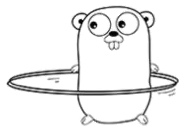4 basic range loop (for-each) patterns
yourbasic.org/golang

- Basic for-each loop (slice or array)
- String iteration: runes or bytes
- Map iteration: keys and values
- Channel iteration
- Gotchas
Basic for-each loop (slice or array)
a := []string{"Foo", "Bar"}
for i, s := range a {
fmt.Println(i, s)
}0 Foo
1 Bar
- The range expression,
a, is evaluated once before beginning the loop. - The iteration values are assigned to the respective iteration variables,
iands, as in an assignment statement. - The second iteration variable is optional.
- For a nil slice, the number of iterations is 0.
String iteration: runes or bytes
For strings, the range loop iterates over Unicode code points.
for i, ch := range "日本語" {
fmt.Printf("%#U starts at byte position %d\n", ch, i)
}U+65E5 '日' starts at byte position 0
U+672C '本' starts at byte position 3
U+8A9E '語' starts at byte position 6
- The index is the first byte of a UTF-8-encoded code point;
the second value, of type
rune, is the value of the code point. - For an invalid UTF-8 sequence, the second value will be 0xFFFD, and the iteration will advance a single byte.
To loop over individual bytes, simply use a normal for loop and string indexing:const s = "日本語" for i := 0; i < len(s); i++ { fmt.Printf("%x ", s[i]) }e6 97 a5 e6 9c ac e8 aa 9e
Map iteration: keys and values
The iteration order over maps is not specified and is not guaranteed to be the same from one iteration to the next.
m := map[string]int{
"one": 1,
"two": 2,
"three": 3,
}
for k, v := range m {
fmt.Println(k, v)
}two 2
three 3
one 1
- If a map entry that has not yet been reached is removed during iteration, this value will not be produced.
- If a map entry is created during iteration, that entry may or may not be produced.
- For a nil map, the number of iterations is 0.
Channel iteration
For channels, the iteration values are the successive values sent on the channel until closed.
ch := make(chan int)
go func() {
ch <- 1
ch <- 2
ch <- 3
close(ch)
}()
for n := range ch {
fmt.Println(n)
}1
2
3
- For a nil channel, the range loop blocks forever.
Gotchas
Here are two traps that you want to avoid when using range loops:
